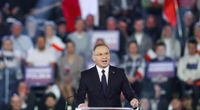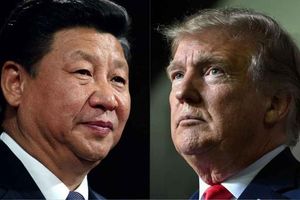On Sunday, April 27, 2025, President Andrzej Duda participated in the election convention of Karol Nawrocki in Łódź, where he addressed the contentious issue of health insurance contributions for entrepreneurs. This debate has intensified following the Senate's recent approval of a law that aims to reduce these contributions starting in 2026, a move that has sparked significant concern among various stakeholders.
During his speech, Duda expressed skepticism about the economic implications of the proposed changes. "I wonder if building Poland's economic prosperity will mean that the wealthiest will pay lower contributions to health care while the poorest will bear the burden, potentially leading to limited healthcare access," he stated. His remarks suggest a serious consideration of vetoing the legislation currently awaiting his signature.
The law, which was passed by the Sejm on April 4, 2025, is projected to reduce revenues to the National Health Fund (NFZ) by approximately 4 to 6 billion zlotys annually. Some estimates indicate that if enacted, the financial gap within the NFZ could widen to 50 billion zlotys by 2026. These alarming figures have prompted numerous appeals to Duda from political figures, including Magdalena Biejat, the left-wing presidential candidate, as well as various patient organizations and healthcare experts, urging him to reject the law.
The government, led by Prime Minister Donald Tusk, has assured the public that the healthcare system will not suffer due to the reduction in contributions. They claim that the NFZ will receive compensatory subsidies from the state budget to offset the expected shortfall. However, many experts remain skeptical of these assurances, pointing out that no legal guarantees have been provided to ensure that the promised funding will materialize.
The proposed amendment introduces a two-tiered system for calculating health insurance contributions for entrepreneurs. Under this system, a lump sum would apply up to a certain income threshold, while a percentage would apply to earnings above that threshold. Specifically, the lump-sum contribution is set at 9 percent of 75 percent of the minimum wage, with additional percentages applied to incomes exceeding defined limits. This change is expected to affect around 2.5 million self-employed individuals in Poland.
Despite the government's assurances, Duda's comments during the convention reflect a growing unease about the potential ramifications of the new law. He pointed out that the reduction in contributions could lead to decreased funding for healthcare services, echoing concerns raised by various experts and political opponents. "Healthcare expenditures will decline simply because there will be less money in the budget, just as there was a shortfall last year," he noted.
As the presidential elections approach, with the first round scheduled for May 18, 2025, and a potential second round on June 1, 2025, the health insurance contribution issue has emerged as a significant point of contention. Duda's support for Nawrocki's candidacy and his critical stance toward Tusk's government underscore the political stakes involved.
The reduction in health insurance contributions has not only divided the government from the opposition but has also created rifts within the ruling coalition. While some parties support the amendment as a fulfillment of electoral promises, others warn that it could exacerbate the existing crisis in the healthcare system. Critics argue that the law is likely to worsen conditions for patients and deepen the financial challenges facing the NFZ.
In an effort to quell the growing dissent, Tusk has pledged to revisit the health insurance contribution issue should Duda choose to veto the legislation. This promise indicates that the debate over healthcare funding will continue to be a pivotal issue in the lead-up to the elections.
As the situation unfolds, the implications of the proposed changes to health insurance contributions remain a critical concern for many Poles, particularly those who rely on the public healthcare system. The outcome of this legislative battle could have lasting effects on the nation's healthcare landscape and the political climate as the elections draw near.
In summary, the health insurance contribution debate encapsulates broader questions about economic equity and the sustainability of Poland's healthcare system. As President Duda weighs his options, the voices of various stakeholders continue to call for a careful reconsideration of the proposed amendments.




